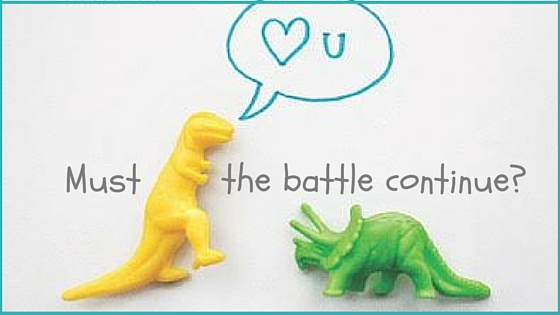
Why dinosaurs?
When I (Crilly) think of dinosaurs, I am immediately taken back to a childhood memory of my grandma’s home. My Grandmother Crilly was a child of the Depression. She grew up a fatherless immigrant and married very young, only to divorce her abusive first husband and marry my grandfather, a quiet and gentle man. My grandma was a neat freak, probably with an obsessive-compulsive disorder that manifested itself in cleanliness. She put paper towels between every plate in the cabinet. She was constantly concerned about bugs getting into her home. She had clear plastic covering her nice sofa and chairs.
Into this squeaky-clean environment entered my brother and I. We did not look forward to visiting her home because we had to be clean and quiet there—two very difficult tasks for young boys. In addition, Grandma did not keep many toys on hand, though she was thoughtful enough to store a few simple children’s toys in a walnut-laminate cabinet in the living room. As I grabbed both handles and opened wide the cabinet doors, I could smell the waxy, plastic odor of the Mold-A-Rama models, remnants of a field trip to the Museum of Natural History. There they were: Tyrannosaurus rex and Triceratops. From the museum’s odd, bubble-topped molding machine, they had made their way to my grandma’s toy cabinet and were about to be engaged in epic prehistoric battles of my imagination: T-rex vs. Triceratops. A fight to the death.
For many of us, that’s how we view spiritual conversations as well. Somehow, we assume that any attempt to love and understand each other is bound to end in a battle: herbivores versus carnivores. When it comes to topics such as faith, religion, or God, we’re afraid it’s impossible to have a conversation with someone who believes differently without ending up in a standoff that would damage the relationship. We’re convinced that followers of Jesus and people who believe differently will end up on opposite sides of any discussion, finding little common ground. And if we have the courage to broach the topic at all, we feel confined to a formula or series of steps. Then the flood of obstacles, fears, and expectations constrains us from winsomely living in the love of Christ and sharing that love with others.
Mary and I are here to say that it doesn’t have to be this way. Meaningful, noncombative spiritual conversations are not extinct—they are possible for all of us.
When I was a boy, the dinosaurs invited me to a place of playfulness, free from the rigid expectations and rules of my grandma’s sterile home. Mary and I hope this book will help you find joy, freedom, and pleasure in talking about God with people who believe differently. We also hope this book will provide simple tools for amateurs and experts alike to engage naturally in the Great Commission. So we, like Jesus, can be winsome and unashamed when we speak of the Kingdom.
John Crilly
Mary Schaller
Co-authors, The 9 Arts of Spiritual Conversations
What you just read is the engaging preface from The 9 Arts of Spiritual Conversations—a book that reviewers insist, “If you’re ready to hit the street and the office and the dinner table with the message of Jesus, then bring this book with you!” Click here for your copy!

Great book, Crilly and Mary! It’s full of helpful, practical suggestions on how each of us can individually practice the 9 Arts and effectively have spiritual conversations with others who believe differently. It also has lots of stories to help us catch the vision of how this can look when people live it out in their daily lives. Thanks, Crilly and Mary, for this beautiful book. I am blessed to know you and inspired because I know that you two live out these practices in your own lives. May many of us be encouraged to keep on practicing these Arts until they become a part of who we are.